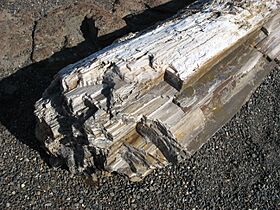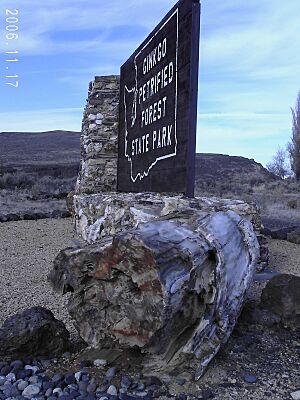Ginkgo Petrified Forest State Park facts for kids
Quick facts for kids Ginkgo Petrified Forest State Park |
|
|---|---|

Petrified logs at the park interpretive center
|
|
| Lua error in Module:Location_map at line 420: attempt to index field 'wikibase' (a nil value). | |
| Location | Kittitas County, Washington, United States |
| Area | 7,124 acres (2,883 ha) |
| Elevation | 791 ft (241 m) |
| Established | 1931 |
| Administered by | Washington State Parks and Recreation Commission |
| Visitors | 163,391 (in 2024) |
| Designated: | 1965 |
Ginkgo Petrified Forest State Park is a special place in Washington state. It covers over 7,000 acres along the Columbia River. This park is famous for its amazing petrified wood. Petrified wood is ancient wood that has turned into stone over millions of years!
Scientists found this petrified wood in the early 1930s. This discovery led to the creation of the park. It became a national historic preserve. More than 50 different kinds of trees have been found here as petrified wood. These include ginkgo, redwood, maple, and even magnolia trees.
Contents
Discovering Ancient Trees
How Trees Turned to Stone
About 15.5 million years ago, this area was a lush, wet forest. Many types of trees grew here. Some of these trees were buried by volcanic ash. Over a very long time, minerals in the groundwater slowly replaced the wood. This process turned the trees into stone, making them "petrified."
These petrified logs were then protected by layers of hard rock called basalt. It was like they were hidden away for millions of years.
The Great Floods
Near the end of the last Ice Age, something huge happened. Giant floods, called the Missoula Floods, swept through the area. This was about 15,000 years ago. These powerful floods carved away the basalt rock. This erosion finally uncovered some of the ancient petrified wood.
People of the Past
The Wanapum Tribe
Long, long ago, the Wanapum tribe lived along the Columbia River. They were the first people to call this region home. They lived by fishing in the river and growing crops. The Wanapum people were friendly to the first white explorers, like Lewis and Clark.
Ancient Rock Art
The Wanapum people also created over 300 petroglyphs. These are pictures carved into the basalt cliffs. They might have even used the petrified wood for tools. The Wanapum tribe never fought with settlers. They also did not sign a treaty for their land.
Building the Park
A Museum for Petrified Wood
In 1927, workers building a highway found the petrified wood. A geologist named George F. Beck started excavations. The Civilian Conservation Corps helped finish the digging. They also built a small museum. The park officially opened to the public in 1938.
Frank Walter Bobo was a key person in collecting the petrified wood. He was known for finding logs in the dry hills. He collected, cut, and polished many specimens for the museum. His son later inherited a large collection of his father's petrified wood.
Saving History from the Water
In 1963, the Wanapum Dam was finished downstream. This dam caused the Columbia River's water level to rise. A new Interpretive Center was built for the park. About 60 petroglyphs were carefully saved from the rising water. Many of these ancient rock carvings are now on display at the Interpretive Center.
Special Recognition
Ginkgo Petrified Forest was recognized as a National Natural Landmark in 1965. This means it's a very important natural site. In 1975, petrified wood was even named the official state gem of Washington!
What to Do at the Park
The park's museum is a great place to visit. You can see displays of petrified wood and the Wanapum petroglyphs. There's also the "Trees of Stone Interpretive Trail." This trail lets you see 22 different kinds of petrified logs. They are still in the exact spots where they were found in the 1930s!
The trail has a 1.5-mile loop and a longer 2.5-mile loop. You can walk through hills covered in sagebrush. The park also has a long shoreline along the Columbia River. You can go swimming or boating there. There are even camping facilities if you want to stay longer!
See also
 In Spanish: Parque estatal del Bosque Ginkgo Petrificado para niños
In Spanish: Parque estatal del Bosque Ginkgo Petrificado para niños
 | Sharif Bey |
 | Hale Woodruff |
 | Richmond Barthé |
 | Purvis Young |



